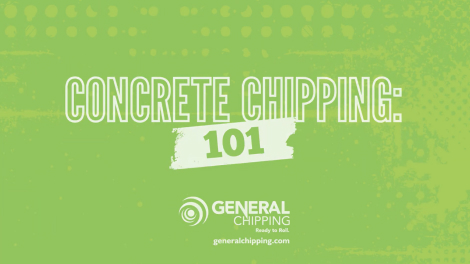
Resources
Concrete Chipping FAQs & Concrete Industry Resources
Are you part of the concrete industry and looking to grow your knowledge? Just need a few answers to questions about your next chipping? You’ve come to the right spot. Below, you’ll find helpful information about concrete drum specs, advice to help your concrete chipping appointments run more smoothly — and other great info aimed at growing your concrete knowledge.
Concrete Chipping Company FAQs
Whether you’re considering working with our concrete chipping and silo cleaning company for the first time or are a returning customer looking to learn more about chipping concrete or General Chipping, we believe arming yourself with information is a good thing. Below, you’ll find answers to some of our most common questions, from scheduling a concrete chipping appointment, to our most-used equipment and how we go about chipping concrete.
-
How do I book a job?
We try to make the booking process as simple as possible. You can set up a concrete chipping appointment online or, if you would prefer a phone call, you can reach us at 1.866.343.8295. We typically ask that you book silo maintenance and concrete removal appointments with enough time to allow for proper scheduling.
-
Do you service companies in my area?
If your company works within the contiguous United States, yes! General Chipping is headquartered in Houston, Texas, but carries out concrete chipping work nationwide. The majority of our work takes place throughout the Southern, Midwestern and Eastern U.S. Visit our Service Areas page for more information.
-
What tools does General Chipping use on the job?
Our team uses a wide range of tools to keep your ready mix concrete trucks, cement storage silos and central mixers operating at peak performance. We arrive at your job site with a fully loaded truck packed with everything we need. That list includes, but is not limited to:
- Handheld Chipping Hammers (also known as jackhammers)
- Compressors
- Chisels
- Shovels
- Hoes
- Impact Rails
- Silo Tripods
In addition, we ensure each General Chipping team member has the personal protective equipment (PPE) they need to carry out their work safely. Such equipment includes:
- Hard Hats
- Masks
- Eye Protection
- Gloves
- Steel Toe Boots
- Hearing Protection
-
How much does concrete chipping cost?
While there is no one-size-fits-all answer to this question, the national average is 9 cents per pound of chipped concrete. Pricing varies from project to project, and depends on a range of factors such as your company’s geographic location, maintenance practices and the individual concrete blends your team puts to use. Certain mixes and additives, for instance, can result in added buildup. In addition, General Chipping is open to negotiations and can work with you. We can even charge per yard of concrete chipped, if necessary. Call 1.866.343.8295 or fill out our online form to schedule your free assessment!
-
How much does it cost to chip a full load of concrete?
As with many of these answers, it depends. If a redi-mix concrete truck’s drum is so full that it is rendered inoperable — and therefore can no longer turn — it proves a more difficult job for our team, and the price will likely be higher. Contact us for a quote.
-
What does General Chipping consider a “full load?”
Each situation and vehicle is different, but at General Chipping we consider a full load to be any redi-mix truck with more than five (5) yards of concrete buildup along drum walls. Five yards is about half of most ready mix truck drums’ capacity. Keep in mind that all drums have an internal volume capacity higher than their rated size, and there is always the chance for a drum with capacity for 10 yards to hold up to 14 yards of hardened concrete. Do not be surprised if you go over five yards of chipped-out concrete, even if you can fit nine yards in your drum.
Why the discrepancy? Consider a standard drum rated for 7.65 cubic meters (10 yards). That drum’s actual carrying capacity is about 12.74 cubic meters (16.6 yards), because it could hold more material if we placed the drum vertically. When tilted at an angle, we could expect any material beyond the approved 7.65 cubic meters to spill out. Concrete, however, hardens. Thus, material exceeding the 7.65 cubic meters remains attached to the drum’s fins and walls.
This is an issue many producers ignore. They tend to believe that if you can haul 10 yards, you have a clean drum. But time after time that has proven incorrect.
-
Is concrete chipping safe for my equipment?
All maintenance work carries a risk of damaging a company’s equipment and/or vehicles. Still, proper upkeep is necessary to ensure safe and efficient operations. At General Chipping, our team is dedicated to doing the job right. We require ongoing safety and OSHA training to ensure our concrete chippers know the ins and outs your specific job. In fact, approximately half of our staff boasts five or more years of experience chipping concrete.
-
I’m interested in working with General Chipping. Where can I learn more?
Thank you for your interest in our company! We are always looking for hardworking, dedicated individuals to join the General Chipping team. Our Careers page offers helpful information, including the ability to apply online. If you have additional questions, please feel free to reach out through the other means of communication listed on the webpage. We look forward to hearing from you!
-
I use chemicals to protect my drums against concrete buildup. Do I still need concrete chipping?
YES! While certain chemicals do an excellent job of warding off concrete buildup, no product is 100% perfect. Even if your company is using chemicals, we still recommend scheduling regular cleanings on a slightly extended timeline, as chippings every three months are most likely unnecessary. It all depends on your company’s needs in relation to seasons, projects, inspections and, of course, your drivers’ cleaning practices.
Strong mixtures during the summer, for instance, tend to result in more buildup. Likewise, a broken-down cement mixer truck or an incident involving a loaded truck will typically mean more buildup is present. Please contact our team to see what chipping maintenance schedule is best for you.
-
How do I prepare for a concrete chipping appointment?
Although not required, we recommend having your truck professionally weighed no more than 1 – 2 days before your chipping appointment and presenting the ticket (with weight date visible) to our team. Upon completion of the job, we recommend having your truck weighed again. This helps to avoid billing discrepancies and provides assurance that our team has removed the amount of dried material for which you were charged.
Please also ensure you have made our team aware of special considerations such as mixers that have experienced prior damage or sites in residential areas that require work outside of traditional hours. In addition, ensure gates are unlocked and General Chipping has easy access to both your job site and the drums, silos and mixers which require service.
-
How long does a concrete chipping appointment take?
The specific amount of time for any given project depends on factors such as your company’s geographic location, the number of trucks in your fleet and the amount of concrete buildup present. However, our team of concrete chipping pros can complete most jobs within one overnight appointment 6 p.m. to 6 a.m. We can provide a more accurate estimate if you provide the details of your specific job.
Reach out regarding your needs, and remember to provide any pertinent information that might impact your work — the number of vehicles, length of time since the last chipping, where your company is located, etc. This helps us better plan for your concrete removal job, and ensures we have the right tools (and right number of workers) to keep your trucks ready to roll.
-
Will General Chipping come to me to carry out our concrete chipping work?
Of course! Our team is proud to provide service throughout the Southern, Midwestern and Eastern U.S. We’ll work with you to schedule the date, time and location of your job. We typically work through the night and leave by early morning.
-
My plant is in a residential area. Can you work during the day?
Yes. We have dealt with many special cases, including plants surrounded by residential areas, those in areas with mandated noise restriction ordinances, night shift plants that only park their trucks during the day and even holiday-only locations. We can always find a solution that makes sense for all parties involved. Simply reach out to get the conversation started.
-
How do I know how much buildup has accumulated inside my ready mix concrete trucks?
At General Chipping, we recommend having someone experienced in chipping concrete perform an inspection by entering the drum. Remember, such work can be highly dangerous and should only be carried out by experienced professionals. Never allow an untrained team member into the drum of your cement mixer truck.
Still Want to Know More?
We’re happy to answer any and all concrete chipping questions.
Glossary of Terms
Cement: A powdery substance made of ground minerals such as chalk, limestone and shells. Cement is the main ingredient in concrete and acts as a binder, hardening and adhering materials to one another.
Cement Mixing Drum: Rotating element which combines the cement, aggregate and water required to create concrete. Such drums are often located on the back of ready mix concrete trucks, although freestanding varieties are also available.
Cement Storage Silo: Large metal tank used to hold cement until the product is needed for concrete creation.
Central Mixer: A portable, rotating device capable of producing large amounts of concrete. Such devices typically pour mixed concrete directly into mixing drums on waiting ready mix concrete trucks so the product can travel to the job site.
Concrete: One of the most common building products in use today, concrete is comprised of cement, water and aggregate such as sand. Exact blends and ingredients vary, depending on strength requirements, aesthetics and other considerations surrounding particular jobs.
Concrete Chipping: A process by which trained crews use handheld jackhammers to break away dried concrete which has formed along the interior walls of companies’ cement mixing drums, central mixers and cement storage silos.
Portland Cement: The most common type of cement used today, Portland cement serves as a key ingredient in building materials such as concrete, stucco and mortar.
Ready Mix Concrete: Concrete prepared inside a production facility and blended to meet project specifications. The finished product is transported to the job site by trucks equipped with cement mixing drums. Other accepted spellings include: Redi Mix Concrete, Redi-Mix Concrete, Ready Mixed Concrete and Ready-Mixed Concrete.
Volumetric Mixer: A concrete production facility in the form of a truck. Volumetric mixers travel to companies’ job sites and produce custom concrete blends in the exact amount required for the job.
Go in Knowing What You Need.
Our concrete calculator makes it easy to gauge exactly how much material your next project will require.

Chipping Concrete: How Does it Work?
We’re glad you asked. Our video covers the ins and outs.
Cement Silo and Ready Mix Drum Maintenance Best Practices
Three months is the recommended timeframe between concrete chipping sessions. Otherwise, you risk excessive buildup which could damage your vehicles and lead to heftier chipping costs.
Chipping appointments vary from job to job, but a solid guideline is to book a 12-hour window to ensure enough time to the job done.
A cement mixer truck drum rated for 10 yards of concrete can actually hold approximately
14 yards total. Still, it should never be filled past the 10-yard line. The extra space allows for easy mixing and wards off issues such as clumped ingredients and inconsistent blends.

